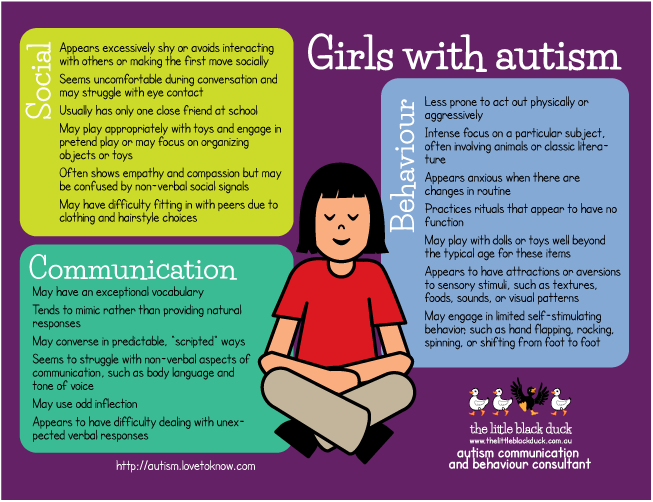Ask for space in a relationship
How Much Space Is Too Much Space in a Relationship?
There are some phrases that can send a chill down your spine when you hear them from your partner. If “We need to talk” is as bad as it gets, “I need some space” isn’t far behind. But the truth is, space isn’t a bad thing, even in a romantic relationship. It may make you feel a little panicky if your partner says that they need some breathing room, but space can be a positive force in a relationship. In fact, it can be a great thing.
What Is Personal Space in a Relationship?
Personal space in a relationship means you're taking time to put yourself first and do things that are just for you—choices that will make you feel great about yourself, putting you in a better mindset to take care of your relationship.
The trick is to get the balance right. If your partner says they need space in your relationship, something has gone a little wrong—either with the partnership or in their own life. So, whether you’ve been together for two months or 20 years, you need to take it seriously. The good news is that it’s an easy enough problem to fix—as long as you can balance giving them space with making sure that you don’t drift apart. If you do it right, you may find that having a little distance makes you feel more grateful for each other and, ultimately, brings you closer together.
So, how much space is too much? Here’s what you need to consider.
Why Do They Need Space?
The first thing you should do is talk to your partner about why they need space. Even if you feel defensive or strange about it, remember that it’s a totally normal, reasonable request for them to make—so make sure that you question it with genuine curiosity rather than getting defensive. It may be that they’re really stressed at work, or feel like they haven’t had enough time with their friends, or maybe they’re just feeling claustrophobic. When you understand what the root of the problem is, it will be easier to know how much space to give—and how to give it.
How Much Space Do They Want?
Once you talk to your partner about why they need space, try to get them to explain how you can give that to them. If they want more time to go to the gym or pursue a hobby, that’s an easy one to negotiate—you can find out how many times a week they want to do that. If they want something more nebulous, like “more alone time,” you may need to ask them to be a little more specific about how you can help them with that.
In general, you should do your best to make it happen—within reason. If they’re saying they want to go travel the world for six months and leave you with two kids at home, you obviously have the right to put your foot down. But, in most cases, you should be able to find a compromise. If it doesn’t feel like a huge shift in your lives or something that will draw a wedge between you, it’s probably OK.
How Can You Check in While Still Giving Them Space?
How do you make sure you give your partner enough space without feeling like you’re drifting away from each other? The key is to make sure that you check in regularly. Space between you doesn't have to feel like distance between you—if you do it right. So tell your partner that you're sorry that they’re struggling and you want to be able to give them the space they need but suggest that you check in every Sunday or every other week. It’s just a chance to touch base, see how things are progressing, and if your partner is feeling any better. It’s also an opportunity to air any concerns you have and talk about how it’s affecting the relationship—positively or negatively. Even if your partner needs space, you still have your own needs that should be considered, so explain that you’ll feel better if you two can stay connected that way. Communication is key.
Space between you doesn't have to feel like distance between you—if you do it right. So tell your partner that you're sorry that they’re struggling and you want to be able to give them the space they need but suggest that you check in every Sunday or every other week. It’s just a chance to touch base, see how things are progressing, and if your partner is feeling any better. It’s also an opportunity to air any concerns you have and talk about how it’s affecting the relationship—positively or negatively. Even if your partner needs space, you still have your own needs that should be considered, so explain that you’ll feel better if you two can stay connected that way. Communication is key.
Just make sure that you find a way to stay connected and touch base with each other as to not drift apart.
How Does It Fit Into Your Relationship as a Whole?
Although most requests for space will be totally reasonable, you do need to consider your relationship as a whole. If your partner has a history of cheating, lying, or refusing to be tied down or take your needs into account, then asking for space may actually just be a way of manipulating or gaslighting you. You know your partner. If they are normally good to you and you have a strong relationship, asking for space is probably a genuine request. But if your relationship is tumultuous or toxic, you may need to be a little more suspicious about what it means. Normally, though, it’s nothing to worry about.
You know your partner. If they are normally good to you and you have a strong relationship, asking for space is probably a genuine request. But if your relationship is tumultuous or toxic, you may need to be a little more suspicious about what it means. Normally, though, it’s nothing to worry about.
If your partner says they need space, it’s easy to panic and think you’ve done something wrong—but the truth is, a little bit of space is healthy in a relationship. Sometimes we start spending too much time together or we miss our friends or we just aren’t feeling like ourselves—and space can help reset the balance. So if your partner says they need some time or some breathing room, trust their instincts and do your best to make it happen. But if you get it right, a little space and a little perspective can make your relationship stronger than ever.
44 Great Date Ideas to Keep Your Marriage Fresh
How To Ask For Space In A Relationship Without Hurting Your Partner's Feelings
Life
by Laken Howard
Ashley Batz/Bustle
When a relationship is brand new and you're still getting to know your partner, it can be hard to imagine wanting to spend time away from them, doing your own thing. But the longer you're together, the more you'll realize that not only is it OK to need time apart, learning when and how to ask for space in a relationship is crucial for it to remain healthy. If you're used to spending tons of time with your partner, it might be scary to hear them say that they need space, but the truth is that asking for alone time doesn't always have negative, ominous implications for your relationship.
"Your partner asking for space is about their desire to get their social, emotional and intellectual needs met by others outside of their primary relationship," Rhonda Milrad, LCSW, relationship therapist and founder of online relationship community, Relationup, tells Bustle. "One person cannot satisfy all the needs of another and your partner’s desire to take space is their effort to take care of themselves and to return to the relationship nourished, enriched and replenished. "
"
You might love your partner's company (and vice versa), but it's unrealistic to expect that your partner can fulfill all your needs: as individuals, we all occasionally need alone time to relax, as well as some one-on-one time with friends and family. If you want to start a conversation with your partner about creating some space in your relationship for both of you to have some time to yourselves, here are five expert tips that will help make (what can be) a tricky conversation go a little more smoothly.
1
Spell Out What Space Looks Like To You
Ashley Batz/Bustle
First thing's first: there isn't just one kind of space in a relationship. Whether you need a weekend away or just an hour-long run to clear your head, make sure you're clear with your partner about what "space" means to you in the context of your relationship.
"Indicate as much as you can what that space will look like," Effy Blue, a relationship coach specializing in ethical non-monogamy, tells Bustle. "'I need a walk around the block. I want to spend the weekend at my parents' home. I want to rent an apartment for six months on the other coast.'"
"'I need a walk around the block. I want to spend the weekend at my parents' home. I want to rent an apartment for six months on the other coast.'"
2
Use "I" Statements
Andrew Zaeh for Bustle
Whenever you need to communicate about something difficult in your relationship, one easy trick is to always use "I" statements when explaining your feelings. It's a simple way of reiterating to your partner that your need for space isn't a reflection of your feelings about them/the relationship, but rather a personal decision that you made for you — and you alone.
"Use I-sentences and explain your why/intention: 'I need space because I need to figure out.../rest/collect my thoughts/write/work on this project,'" Blue says.
3
Listen To Your Partner's Concerns
Naturally, your partner might have some questions or concerns about your request for space. Instead of dismissing their feelings or giving them a vague, blanket-like reassurance ("don't worry, it'll be fine"), listen to their specific concerns and offer to come up with a plan or compromise together.
"Listen to your partners' fears and anxieties with a generous ear when your partner tells you how they feel about your request," Blue says. "Don't be dismissive. If it makes sense, make a plan to reconnect afterward."
4
Remember That You Are Individuals First & Partners Second
Andrew Zaeh for Bustle
Whether you're the one asking for space or the one being asked for space, it's important to keep in mind that — as much as you might love each other — you and your partner are both individuals with individual needs... not extensions of one another.
"Recognizing our partner as an individual [and] not an extension of ourselves and/or a product of our relationships is vital to the longevity of our relationships," Blue says. "If a partner is asking for space they are taking care of themselves and we need to honor their individual needs. When I see clients struggling with partners asking [for] space — be it feeling hurt, offended, anxious — my response is more often than not, 'It's not always about you. '"
'"
5
Agree On What Balance Of Independence/Togetherness You Want
Ashley Batz/Bustle
When it comes to asking for space, it can be difficult to know how much is too much (or too little). But according to Milrad, it's not about finding a magic "ideal" amount of space — it's about whether you and your partner are on the same page about the balance of "we" and "I" in your relationship.
"If you both define the balance in the same way, then together, you will determine how much alone time is right for the relationship," she says. "If you don’t, then there will be a disagreement in terms of whether it is too much or too little."
Ultimately, keeping a relationship happy and healthy doesn't boil down to having the "correct" amount of space or alone time — because that simply doesn't exist. What's really important is that you and your partner are able to communicate: about what kind of space you each want/need, how much you feel comfortable with, and what it means when you ask for more or less alone time. As long as you're both on the same page, you'll be able to enjoy your time together, as well as feel fulfilled and secure in your relationship when you're apart.
As long as you're both on the same page, you'll be able to enjoy your time together, as well as feel fulfilled and secure in your relationship when you're apart.
Is it worth keeping personal space in a relationship?
When counseling young married couples at the Center, a situation often arises when one of the spouses touches on the topic of personal space. So is it necessary in a family where everything seems to be one? Let's talk about this today.
At the first stages of a love relationship, one wants so much to be close to a person every second - to see him and admire his every movement, listen to his compliments and give him compliments in return. Even at night, even if your relationship has not reached the intimate stage, you still want to see your loved one. Whether it's love or addiction, it doesn't matter. One thing is important - the person must be next to you, otherwise you begin to experience discomfort, you do not want to do anything. Even if you used to sleep soundly, you cannot close your eyes without a loved one. This is such a nice romantic story. If only this moment could last a lifetime. But alas, time passes, and your relationship grows with time. You decide to tie the knot, have a baby and live together. Well, great plans. But you feel that your relationship is not as warm and hot as before. If a couple of years ago you could not breathe without each other, today you no longer feel such a sharp need. Yes, you have common interests, you feel good together, but you no longer spend every minute with each other. Your partner increasingly has a desire to be alone or go to meet friends, and you do not mind spending your leisure time separately.
This is such a nice romantic story. If only this moment could last a lifetime. But alas, time passes, and your relationship grows with time. You decide to tie the knot, have a baby and live together. Well, great plans. But you feel that your relationship is not as warm and hot as before. If a couple of years ago you could not breathe without each other, today you no longer feel such a sharp need. Yes, you have common interests, you feel good together, but you no longer spend every minute with each other. Your partner increasingly has a desire to be alone or go to meet friends, and you do not mind spending your leisure time separately.
The desire to find time for solitude is very difficult for the fair sex to perceive. It may seem to them that the man fell out of love, lost interest, and even started an “affair” on the side. As for men, they are less vulnerable and understand the importance of personal space. When they spend every hour with their chosen one and only with her, they begin to feel bound hand and foot, as if their whole life is under someone else's control. Men strive for freedom and independence. If they are married, there is no question of complete freedom, and men (at least those who made the decision to marry consciously) do not demand it, but they will defend their right to personal space at any cost. Everything would be fine, however, men also have their “sins”. Some of them, zealously defending their own right to have personal space, infringe on their beloved in this right. They do not allow her to meet with her friends, to be alone with herself, etc., as they are afraid of a possible betrayal by a partner. In addition, most men are owners and want their woman to be with them only. The result of such actions causes dissatisfaction among women and demands to respect equality. Alas, it is often the lack of personal space of one of the partners that is the reason for the breakdown of relations. The reason for the lack of personal space in relationships is the stereotype imposed on many since childhood “beloved hearts should always do everything together”.
Men strive for freedom and independence. If they are married, there is no question of complete freedom, and men (at least those who made the decision to marry consciously) do not demand it, but they will defend their right to personal space at any cost. Everything would be fine, however, men also have their “sins”. Some of them, zealously defending their own right to have personal space, infringe on their beloved in this right. They do not allow her to meet with her friends, to be alone with herself, etc., as they are afraid of a possible betrayal by a partner. In addition, most men are owners and want their woman to be with them only. The result of such actions causes dissatisfaction among women and demands to respect equality. Alas, it is often the lack of personal space of one of the partners that is the reason for the breakdown of relations. The reason for the lack of personal space in relationships is the stereotype imposed on many since childhood “beloved hearts should always do everything together”. If both partners adhere to this principle and are ready to be together every second (and even go to the toilet together) - no problem, so be it. The main thing is that both of them feel good about it. But, as practice shows, such couples are in a clear minority.
If both partners adhere to this principle and are ready to be together every second (and even go to the toilet together) - no problem, so be it. The main thing is that both of them feel good about it. But, as practice shows, such couples are in a clear minority.
Which couples find it easiest to agree on personal space? Those in which both partners do not support the stereotype “beloved hearts should always do everything together” and honor their right to personal space. But, more importantly, they respect the partner's right to have personal space and completely trust him. They know that wherever their partner goes without him / her, he will remain faithful and never betray. And trust is everything in a relationship. Indeed, in families in which there is no trust, jealousy arises.
Jealousy, in turn, leads to constant conflicts, the end result of which may be a divorce. Worst of all, when one of the partners (in 90% this is a woman) does not agree that the partner should have personal space.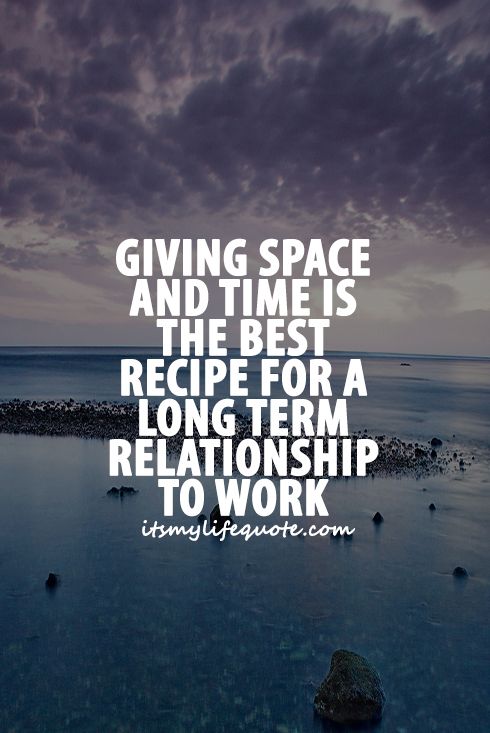 They attribute this to love and the desire to save the family, but in reality it looks like an unhealthy addiction and the first step towards the end of a relationship. Constant calls for no reason, hundreds of SMS messages a day, and even ... a secret agent who is watching a partner. What people will not do to have complete control over a person. Is this behavior correct? If you seek to destroy the family and cause discontent of the partner, then yes. In other cases, this should not be done. A person's need for personal space is as universal as his need for recognition, respect, communication and love. For some, this need is more pronounced, and for some it is less, but the fact remains that there is such a need, and sooner or later a person will try to satisfy it. Why is it so necessary for a person? Just in order not to go crazy from the monotony of life, and also not to lose your human appearance. A person should feel that he has his own territory, which is completely under his control.
They attribute this to love and the desire to save the family, but in reality it looks like an unhealthy addiction and the first step towards the end of a relationship. Constant calls for no reason, hundreds of SMS messages a day, and even ... a secret agent who is watching a partner. What people will not do to have complete control over a person. Is this behavior correct? If you seek to destroy the family and cause discontent of the partner, then yes. In other cases, this should not be done. A person's need for personal space is as universal as his need for recognition, respect, communication and love. For some, this need is more pronounced, and for some it is less, but the fact remains that there is such a need, and sooner or later a person will try to satisfy it. Why is it so necessary for a person? Just in order not to go crazy from the monotony of life, and also not to lose your human appearance. A person should feel that he has his own territory, which is completely under his control. No one has the right to enter this territory - even the closest people. Thus, we can safely say that personal space in relationships can and should be observed, because violation of a person’s personal space leads to frequent conflict situations. Personal space of a person in concrete numbers. It is impossible to say 100% about the existence of a personal distance that should be observed, because for each person these indicators will be individual. However, it is possible to consider the average indicators of the zones within the personal bodily space of a person.
No one has the right to enter this territory - even the closest people. Thus, we can safely say that personal space in relationships can and should be observed, because violation of a person’s personal space leads to frequent conflict situations. Personal space of a person in concrete numbers. It is impossible to say 100% about the existence of a personal distance that should be observed, because for each person these indicators will be individual. However, it is possible to consider the average indicators of the zones within the personal bodily space of a person.
1. Personal zone - from 50 to 150 centimeters. This zone has an oval shape, it is longer in front and behind than on the sides. This distance must be observed in a confidential conversation.
2. Public area - up to 6-7 meters. This is the perfect area for public speaking. For example, in these aisles there should be an audience from the speaker at the time of his speech. The public area is the most remote area of space that a person perceives as having relation to him.
3. Social zone - from 1.5 to 4 meters. This zone must be respected when communicating with strangers. Naturally, when it comes to family relationships, the partner can in no way be classified as “strangers”. However, knowing about this zone will never be superfluous.
4. Intimate zone. This zone is the main one in family relationships, it is this zone that is most often violated at the moment when one of the partners wants to be alone with himself, in his personal space. You must have seen in one of the series or films how one of the partners came very close to the other, after which the first one pushed the partner away from himself. This is called a violation of the intimate zone of a person. This zone is measured by the distance of an outstretched arm (approximately 50 cm). If your partner tells you that he wants to be alone - do not try to violate his intimate zone, otherwise it threatens with a scandal.
Now let's move from words to deeds and see what a person needs to do in order to preserve personal space for his partner: arranges. Invasion of personal space is a ticking time bomb that will explode exactly at the moment when you least expect it. At the beginning of a family relationship, the partner does not perceive the invasion of his personal space as something wrong. The reason for this is the numerous problems that the family needs to solve in order to start a full-fledged family life. In addition, each of the partners tries on a new role - the role of a spouse, which imposes many responsibilities on him. However, when family life enters a normal course, depriving a partner of personal space becomes very annoying. If you don’t let your partner go out with friends or even just be alone with himself, for the first time he will normally say about it. The second time he will say this more convincingly, but if the situation does not change after that, expect a scandal. A person will not give up his right to personal freedom so easily. Moreover, it is absolutely correct. The only person to whom this seems wrong is a partner who deprives his loved one of this right.
Invasion of personal space is a ticking time bomb that will explode exactly at the moment when you least expect it. At the beginning of a family relationship, the partner does not perceive the invasion of his personal space as something wrong. The reason for this is the numerous problems that the family needs to solve in order to start a full-fledged family life. In addition, each of the partners tries on a new role - the role of a spouse, which imposes many responsibilities on him. However, when family life enters a normal course, depriving a partner of personal space becomes very annoying. If you don’t let your partner go out with friends or even just be alone with himself, for the first time he will normally say about it. The second time he will say this more convincingly, but if the situation does not change after that, expect a scandal. A person will not give up his right to personal freedom so easily. Moreover, it is absolutely correct. The only person to whom this seems wrong is a partner who deprives his loved one of this right.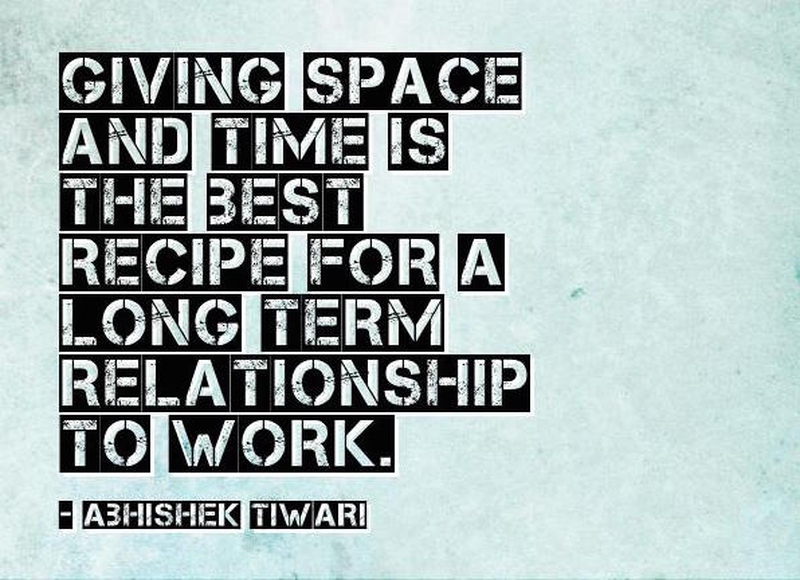 Often a partner is afraid of offending a person close to him and tries to endure the invasion of his personal space. But his inner discontent is constantly growing, a person is visited by gloomy thoughts, whether he wants it or not. One day he will not be able to endure and will express to his partner everything that has “boiled” in his soul. And the longer a person restrained his inner discontent, the stronger the scandal and screams will be. Do you want that? Therefore, advice - listen to what your partner wants to tell you, and do not consider solely your own interests. If a partner once tells you about his personal space, do not try to ignore him, otherwise the next time he will no longer be so nice and gallant in expressing his own point of view regarding personal space.
Often a partner is afraid of offending a person close to him and tries to endure the invasion of his personal space. But his inner discontent is constantly growing, a person is visited by gloomy thoughts, whether he wants it or not. One day he will not be able to endure and will express to his partner everything that has “boiled” in his soul. And the longer a person restrained his inner discontent, the stronger the scandal and screams will be. Do you want that? Therefore, advice - listen to what your partner wants to tell you, and do not consider solely your own interests. If a partner once tells you about his personal space, do not try to ignore him, otherwise the next time he will no longer be so nice and gallant in expressing his own point of view regarding personal space.
2. Start respecting your personal space. It sounds a little strange - how can a person who deprives his partner of this space himself begin to respect and defend his right to personal space? That's the secret! How can a person who has not seen it in his eyes learn to appreciate gold? A person also learns all the charms of family life only after he first ties himself up with marriage. If you were brought up in your family according to the principles “husband and wife are one Satan”, “husband and wife should spend all the time together”, etc., you probably do not know what it means to have your own personal space. From your ignorance, you are trying to bind a partner to yourself, as a result of which both you and he suffer. If your partner repeatedly asks you to respect your personal space, instead of tantrums and statements like “You can’t have space apart from me,” tell your partner “OK, only then you respect my right to personal space.” Believe me, he will gladly accept your offer. But what if all your interests are directly related to a partner and only to him? In this case, follow tip number 3.
If you were brought up in your family according to the principles “husband and wife are one Satan”, “husband and wife should spend all the time together”, etc., you probably do not know what it means to have your own personal space. From your ignorance, you are trying to bind a partner to yourself, as a result of which both you and he suffer. If your partner repeatedly asks you to respect your personal space, instead of tantrums and statements like “You can’t have space apart from me,” tell your partner “OK, only then you respect my right to personal space.” Believe me, he will gladly accept your offer. But what if all your interests are directly related to a partner and only to him? In this case, follow tip number 3.
3. Find a hobby. You must have interests that have nothing to do with your partner. You must have friends. So why don't you join a club together or do aerobics. This is good for your body and for your family relationships. In addition, if you have been married for more than a year, it will be useful for you to take a break from each other.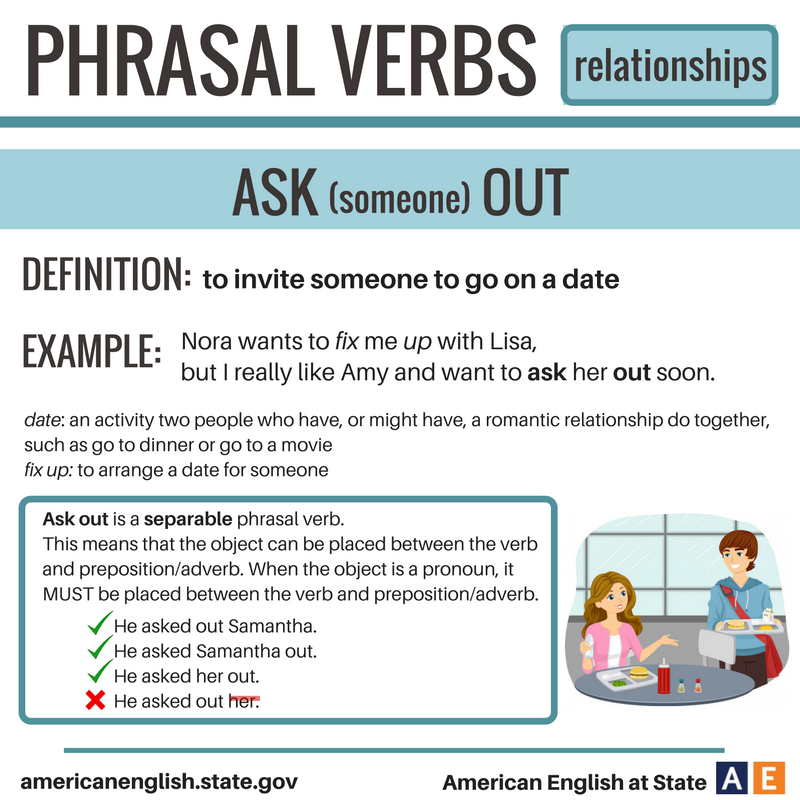 It may be hard for you to believe it now, but it is really useful. Your hobby will captivate you so much that you will no longer be dependent on the presence of your partner, and he will be able to dispose of his personal space at his own discretion. The main thing is not to get carried away with a hobby too much, otherwise you risk accidentally and completely forget about the existence of a partner. And this is not a joke, such cases have already taken place in real married life.
It may be hard for you to believe it now, but it is really useful. Your hobby will captivate you so much that you will no longer be dependent on the presence of your partner, and he will be able to dispose of his personal space at his own discretion. The main thing is not to get carried away with a hobby too much, otherwise you risk accidentally and completely forget about the existence of a partner. And this is not a joke, such cases have already taken place in real married life.
4. Away with total control. It seems to you that you are obliged to control every step of your partner. What right do you have to do this? Yes, he is your spouse, however he is not your slave. If you have a habit of checking your partner's phone calls, asking his colleagues if anyone on the side is not wound up with him, checking his pockets and calling every five minutes with the same question “How are you?” Get rid of this habit immediately. The price of the question is very high - this is the fate of your family. It depends on your decision whether your love story will have a future or not. The only reason why your partner tolerates total control and has not yet said everything directly to your face is the unwillingness to offend you. In his heart, he hopes that you will calm down and stop controlling him, but believe me - one day the cup of his patience will overflow. Just put yourself in his place. What would happen if your partner installed surveillance on you and controlled your every move? Would you approve of this? Of course not. In this case, and you do not try to control every step of the partner. Respect his right to have his own space. And what significant change can happen in a person's life in the five minutes that have passed since your last call? The desire to constantly control a partner kills the most valuable thing in a relationship between two people - a feeling of caring and reverent attitude towards each other. This feeling can only be preserved by maintaining personal space.
It depends on your decision whether your love story will have a future or not. The only reason why your partner tolerates total control and has not yet said everything directly to your face is the unwillingness to offend you. In his heart, he hopes that you will calm down and stop controlling him, but believe me - one day the cup of his patience will overflow. Just put yourself in his place. What would happen if your partner installed surveillance on you and controlled your every move? Would you approve of this? Of course not. In this case, and you do not try to control every step of the partner. Respect his right to have his own space. And what significant change can happen in a person's life in the five minutes that have passed since your last call? The desire to constantly control a partner kills the most valuable thing in a relationship between two people - a feeling of caring and reverent attitude towards each other. This feeling can only be preserved by maintaining personal space.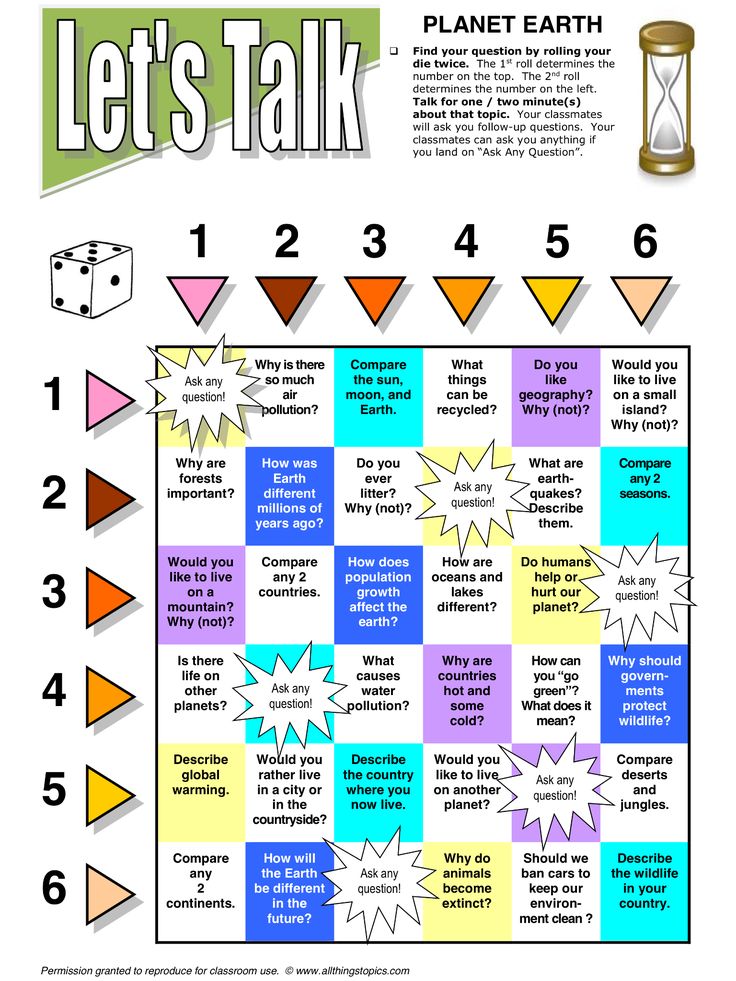
5. Recognize that you and your partner may have different interests. If your spouse loves football and attends every match of his favorite team with friends, do not interfere with this. Instead of the indignation “You're not going anywhere!”, it's better to keep him company. Who knows, maybe you will enjoy football too, and this is another joint interest that will help strengthen your relationship. The same applies to men - you should not forbid your spouse to go shopping for hours. Keep her company. After all, she buys clothes in order to please you. And this means that she may need your advice regarding a particular potential purchase. If the probability that you can share his hobby with a partner is zero - do not despair, because you can always spend the free time that has appeared on things that please you. 6. Understand once and for all that spending some time apart with your partner is a normal and natural process. Each person has his own needs and desires, which are not always associated exclusively with a partner. Therefore, discuss in advance with your partner the issue of personal space, the right to which each of you has. This will allow you to avoid misunderstandings and possible scandals in the future.
Therefore, discuss in advance with your partner the issue of personal space, the right to which each of you has. This will allow you to avoid misunderstandings and possible scandals in the future.
7. Love and care should also be in moderation. It seems to you that the more attention you give your partner, the more he will love you. As a rule, this is so. However, even this should not be overdone. Excessive attention can lead to the fact that such a relationship is simply boring for a person. Imagine that you are adding spoonful of sugar to your tea. At first, with each new spoon, you feel that the tea only becomes tastier, but after the fifth spoon, it becomes impossible to drink from excessive sweetness. It is the same in relationships - love your partner and take care of him, just know the measure in your care. In addition, the more often you show care, the more a person gets used to it and begins to appreciate it less. Think about it... 8. Don't demand love and attention from your partner. You do not have to rearrange the life of your family and fit it to any standard. Your partner should pay attention to you, but he should do it sincerely, and not because you require it from him. Never give ultimatums like “Either you spend the weekend with me, or I deprive you of….” and other ultimatums - so you will not achieve anything. Although no, why, you will achieve it anyway - let your partner understand what kind of “fruit” you are and, perhaps, take the first step towards breaking the relationship.
You do not have to rearrange the life of your family and fit it to any standard. Your partner should pay attention to you, but he should do it sincerely, and not because you require it from him. Never give ultimatums like “Either you spend the weekend with me, or I deprive you of….” and other ultimatums - so you will not achieve anything. Although no, why, you will achieve it anyway - let your partner understand what kind of “fruit” you are and, perhaps, take the first step towards breaking the relationship.
9. If your partner accepts the existence of personal space, and you are his ardent opponent, do not try to convince your partner and change his point of view. It is best to agree that each of you will have a personal space. No one has yet managed to remake a partner for themselves, so do not do nonsense. Be with your partner more often, share his interests and respect his right to personal space - and then your family will have a bright and happy future.
Author: Anton Yasyr for therapy. by website
by website
Source: http://www.therapy.by/articles/lichnoe_prostranstvo_v_otnosheniyah
that the partner would like to increase the emotional and physical distance, perceive it painfully, feel rejected and abandoned. The atmosphere in the family is heating up,” explains psychologist Li Lang. - Alas, one often has to observe a situation where one partner wants to move away, and the second, feeling this, tries by hook or by crook to pull him to himself. As a result, because of this “tug of war”, both suffer.”
What if you need more time for yourself than for your partner? How to choose the right words and convey a request to him so that he does not misunderstand your words? How to convince that both of you will only win as a result? Here's what the relationship experts say.
Explain what, in fact, you mean by time for yourself
First of all, you should decide for yourself what, in fact, is personal space and “time for yourself” for you. It is unlikely that you mean the need to live separately from your partner. More often than not, it's about spending at least half the day off alone doing what you enjoy: drinking tea, lounging on the couch with a book, watching a TV series, crushing opponents in a video game, or building a mock-up airplane.
More often than not, it's about spending at least half the day off alone doing what you enjoy: drinking tea, lounging on the couch with a book, watching a TV series, crushing opponents in a video game, or building a mock-up airplane.
“Explain that all you need is to recover a bit, collect your thoughts and relax,” suggests Talya Wagner, family therapist and author of Married Roommates. - And the main thing here is to be able to look at the situation through the eyes of a partner. This way you can both understand each other better and learn to support each other.”
Choose the right words
Since the topic is quite sensitive, it is important to pay attention to both word choice and tone. It depends on how the partner perceives your words: as a harmless request or a signal that family happiness is over. “It’s important to be as gentle as possible and emphasize that you both win in the end,” says Wagner. “But if you get annoyed and blame, your message is hardly perceived correctly. ”
”
So instead of complaining that you're running out of energy (“I'm so tired of these problems at work and at home! I need to be alone”), say, “I think we both need a little more time for yourself, more personal space. This will benefit both each of us and the relationship as a whole.”
Emphasize the benefits of spending time apart
“Too much fusion, when we do everything together all the time (we are family!), banishes all romance and playful moods from the relationship,” says psychologist and sex therapist Stephanie Buhler . “But the time spent apart allows us to look at each other with a fresh look and maybe even experience a desire that has long left us.”
Don't forget about your personality type and that of your partner.
According to Buhler, introverts often need personal space, which is understandable. Spending time alone helps them recharge, but this can be difficult for their extrovert spouses to accept. “Introverts literally fade away if they can’t spend time alone with themselves: dreaming, reading, walking, thinking. If this is your case, describe to your partner in detail how you feel.”
If this is your case, describe to your partner in detail how you feel.”
Remind your partner that you love them
We can show love and experience different types of affection in different ways. If a partner is anxiously attached to you, stability and security are important to him in a relationship, it is important to know that you will not leave him or her. In a conversation with such a person, it is important to emphasize that your desire for freedom is not at all a sentence to relationships. You love your partner dearly, but in order to continue doing this in the future, you need a little more time for and for yourself.
Plan something together after taking time for yourself
Nothing will calm him better than the fact that after spending time alone with yourself, you will return “to the family” peaceful, rested, happy and ready to invest in relationships. In addition, now you can fully enjoy joint activities without sighing to yourself about how nice it would be to stay at home alone and spend the evening on the couch.


